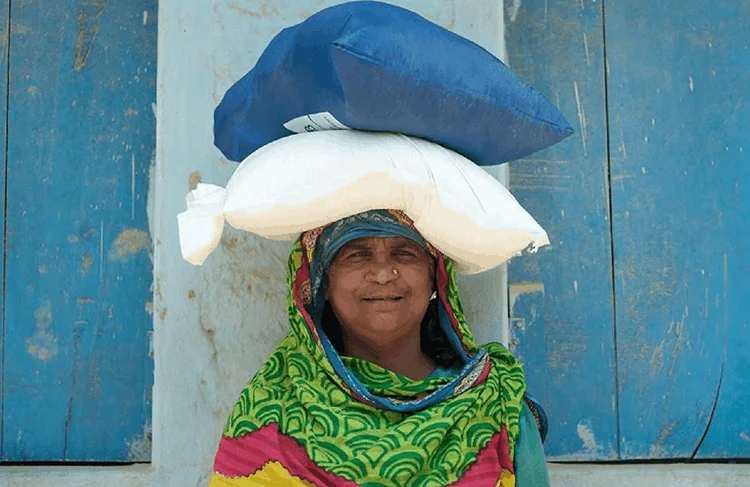Zakat al Fitr (Fitrana)
Before the Eid ul Fitr prayer, every self-supporting Muslim adult who has food in excess of his needs must pay Zakat ul Fitr. Donate online.
What is Zakat ul Fitr (fitrana)?
Zakat ul Fitr (also known as fitrana) is a charitable donation of food that must be given before Eid prayer, before the end of the month of Ramadan, for the love of Allah. Zakat ul-Fitr is compulsory upon every self-supporting adult Muslim who has food in excess of their needs, on behalf of themselves and their dependants.
Ibn `Abbas (may Allah be pleased with him) reported:
“The Messenger of Allah (peace be upon him) ordained Zakat ul Fitr [Fitrana] to purify the fasting person from indecent words or actions, and to provide food for the needy. It is accepted as Zakat for the person who gives it before the Eid prayer; but it is a mere Sadaqah for the one who gives it after the prayer.” [Abu Dawud and Ibn Majah]
The quantity is described by the Prophet (PBUH) as 1 saa’ of food, and 1 saa’ is equivalent to 4 madd. A madd is the amount that can be scooped up when one puts their hands together. If we translate this into a monetary value based on the price of a staple food such as flour or rice, it is approximately $5. Therefore the amount due for each person is $5.

As Islamic Relief acts as a charitable agent, we can therefore be given the money to pay for the food beforehand which we will then spend where needed at the correct time to buy the food. As a result, this will be distributed among those people around the world that are in need.
Donate Now
How much is Fitrana (Zakat ul Fitr) per person?
At the time of the Prophet (PBUH) Fitrana (Zakat ul Fitr) would be given as 1 saa’. Therefore the quantity is described by Prophet (PBUH) as 1 saa’ of food (1 saa’ is equivalent to 4 madd). A madd is the amount that can be scooped up when one puts their hands together.
We are frequently asked ‘how much is Eid fitrana?’. If we translate this into a monetary value based on the price of a staple food such as flour or rice, it is approximately $5. Therefore, the amount due for each person is $5.
Who is it obligatory on to pay fitrana (zakat ul Fitr)?
Any Muslim who has food in excess of their needs must pay zakat ul Fitr (Fitrana). Unlike zakat, it is a duty on everyone in your household. Therefore, the head of the household, or parents and guardians, can pay on behalf of other members of the family.
What is Eid fitrana?
Fitrana, sometimes referred to as Eid fitrana or sadaqatul fitr, is a charitable donation that must be given before the Eid al Fitr prayer. Therefore it must be given before the end of the month of Ramadan.
What is sadaqatul fitr?
Sadaqatul Fitr is an alternative name for Fitrana or Zakat ul Fitr.
Fitrana FAQs
Fitrana (zakat ul Fitr) is incumbent on every Muslim who possesses 1 saa’* of food which is not needed as a basic necessity for themselves self or their family for the duration of 1 day and night.
*The quantity is described by Prophet (PBUH) as one saa’ of food. One saa’ is equivalent to four madd. A madd is the amount that can be scooped up when one puts their hands together.
Ibn `Abbas (may Allah be pleased with him) reported:
“The Messenger of Allah (peace be upon him) ordained Zakat ul Fitr to purify the fasting person from indecent words or actions, and to provide food for the needy. It is accepted as Zakat for the person who gives it before the Eid prayer; but it is a mere Sadaqah for the one who gives it after the prayer.” [Abu Dawud and Ibn Majah]
Fitrana (Zakat ul Fitr) must be paid within the month of Ramadan. The latest it can be paid is before the Eid prayer begins so that those in need can benefit in time for Eid.
Ibn Abbas narrates:
“It is accepted as Zakat for the person who gives it before the Eid prayer; but it is a mere Sadaqah for the one who gives it after the prayer.” [Abu Dawud]
It is compulsory for every member of a household including children and babies to pay Zakat ul Fitr (Fitrana). However, parents/guardians may pay on behalf of their children/dependents.
The majority of scholars hold the opinion that only the first two categories of the recipients of Zakat can receive Fitrana.
Fitrana FAQs : Miscellaneous
One of the conditions of Fitrana (Zakat ul Fitr) is that it must be paid before the Eid prayer. However, if paid after it will be treated as Sadaqah, therefore the reward will be lesser.
An agent is someone who facilitates your paying of Fitrana (Zakat ul Fitr) because they are better placed to distribute it. You can pay them in currency because it is as if you are asking them to pay on your behalf. We use that money to buy the food which we give to the appropriate recipients, therefore, it is as if you are the one giving food rather than currency.
Yes you can, according to the Hanafi Madh-hab. The Shafi’i Madh-hab also follows follows this ruling.
Visit our Zakat page for answers on frequently asked questions around zakat.
- Scholar Verified
We ensure our content is reviewed and verified by qualified scholars to provide you with the most accurate information. This webpage was last reviewed by Sheikh Saalim Al-Azhari.
Page last reviewed: 01 April 2022
Next review due: Within 12 months










